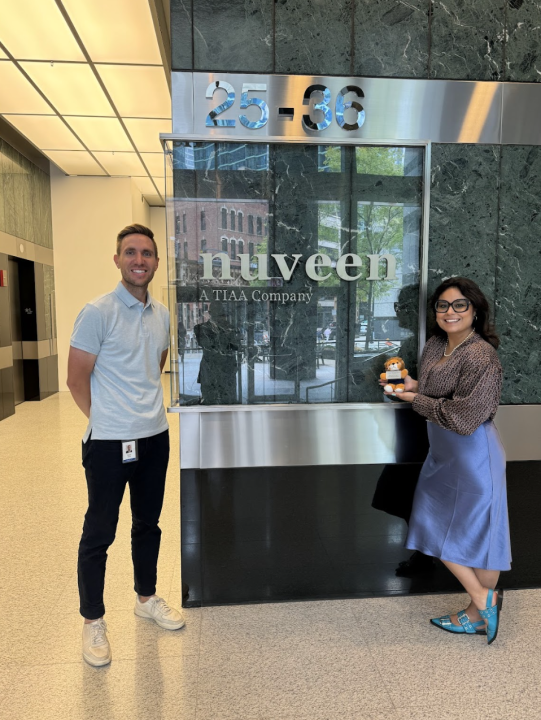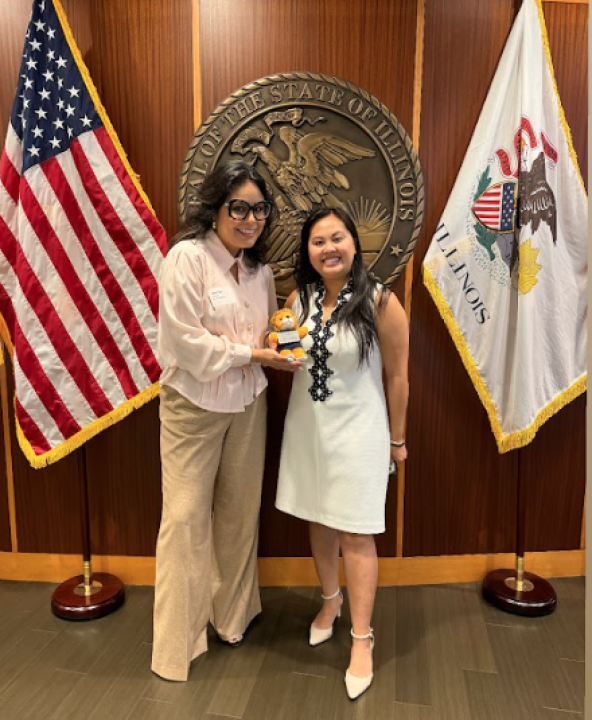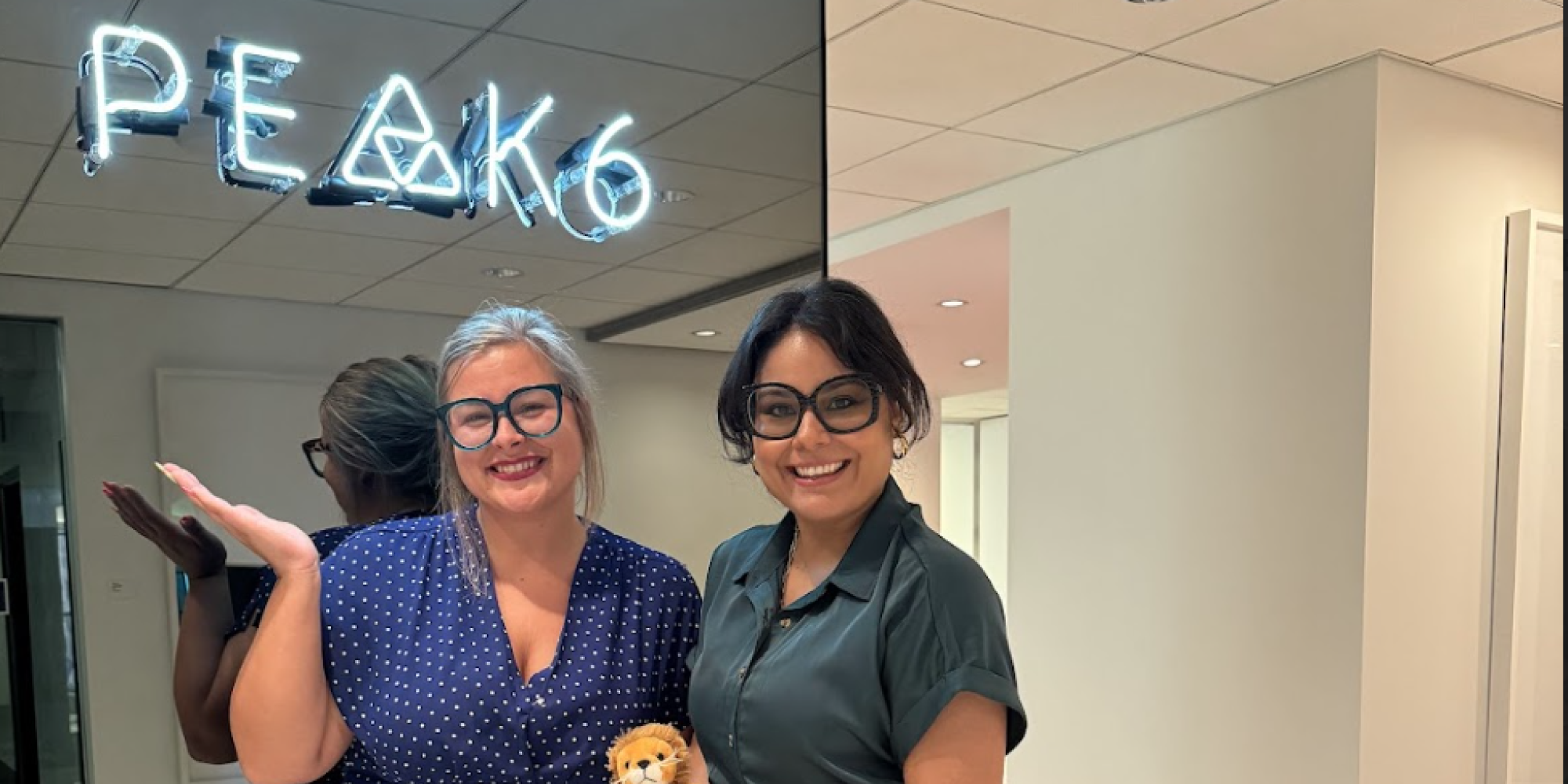This summer, CCE’s Karla Puga, Senior Associate Director of Employer and Alumni Relations, visited Chicago to learn more about career paths and opportunities in the Windy City. Read on for a blog post from Karla sharing her experiences and highlighting key takeaways.
From July 14 through July 18, I traveled to Chicago as part of the second wave of our “CCE On The Road” summer series. During this trip I met with a wide range of employers and alumni across industries. I also brought along a special guest: our school’s beloved mascot, Roar-ee the lion (a travel-sized stuffed animal version, of course)! Roar-ee, the Associate Direct-ROAR for the trip, was a big hit and made our meetings even more memorable.
During my Chicago adventure, I met with the following employers:
Check out their profiles and current opportunities on LionSHARE; some of these employers are visiting campus this fall, so follow the ones you are interested in and stay up to date.
Here’s what Roar-ee and I discovered in our conversations with employers and how these valuable insights can help you on your career journey.
Chicago Vibes: A City of Opportunities
Before diving into the insights from employers and alumni, I have to mention how amazing Chicago is as a city. Known for its stunning architecture, Chicago is home to iconic skyscrapers like the Willis and Marina Towers and historic buildings that offer a glimpse into the city’s past. It’s also a city of great size—large enough to offer all the excitement and opportunities of a major metropolitan area but more affordable compared to cities like New York or San Francisco. This makes it an attractive option for young professionals starting their careers, whether through an internship or a full-time opportunity.
Chicago’s vibrant restaurant scene was another highlight of my trip. From deep-dish pizza to gourmet dining experiences around the city and the Loop, the variety of food options reflects the city’s diversity and culinary creativity. As one of the most diverse cities in the U.S., Chicago’s neighborhoods are a cultural mosaic, each offering its own unique flavors, traditions, and atmospheres.
Art and music lovers will find Chicago to be a haven for creativity. The city’s museums, galleries, and theaters are world-class, and its music scene is legendary, ranging from blues and jazz to contemporary indie and hip-hop. Exploring Chicago’s art and music scenes is not just entertaining but also inspiring, making it a great place to live, work, and grow both professionally and personally.
What Employers Are Looking For
During my meetings with employers, several key themes emerged. Across the board, companies are looking for candidates with strong problem-solving abilities, adaptability, and communication skills. Whether in consulting, government, finance, or another industry, the ability to work well in teams and present ideas clearly is highly valued.
Employers also emphasized the importance of showing genuine interest in their companies. They appreciate candidates who take the time to explore their websites, utilize available career resources, and stay up to date with the company’s projects and initiatives. Staying informed through the company’s website, LinkedIn, industry news, or even general market trends demonstrates a proactive attitude and commitment to understanding the company’s goals and values.
Many employers emphasized the importance of having a blend of technical skills (such as data analysis and proficiency in industry-specific software) and soft skills (like leadership, intellectual curiosity, and emotional intelligence). Catie Murphy from Capgemini mentioned, “We can teach you the technical skills during internships, but what stands out is your passion, teamwork, and your ability to connect with clients and colleagues.”
Liz Conwell from Compass Lexecon, a consulting economic research firm, highlighted that they are looking for candidates who have taken economics classes, possess knowledge in data analytics and modeling, and demonstrate a strong aptitude for research. Similarly, Jordan Stunkel from Peak6 and Russel Aivazian from JLL noted that they prefer candidates with an acumen for trading or real estate, which can be demonstrated through relevant coursework, certifications, or extracurricular activities showcasing a genuine passion for these sectors.
Arden Friend from Peak6 mentioned an interesting skill: the ability to play poker. According to Friend, poker can help develop valuable skills like risk appetite, decision-making, critical thinking, and resilience. These are crucial attributes in trading and finance, where understanding and managing risk, making quick decisions, and maintaining composure under pressure are essential.
Additionally, Nancy Huynh (Deputy Director of Government Affairs) and Karen Sheley (Deputing General Counsel and Chief Compliance Officer) of the Office of the Illinois Governor emphasized the need for candidates who are enthusiastic, outgoing, and resourceful. They emphasized how essential strong research and effective communication skills are to government roles. Deputy Sheley also noted that students who participate in their James H. Dunn Jr. Memorial Fellowship Program often go on to pursue greater opportunities in law and government. This advancement is due in part to the exposure to valuable networks and the significant work students are involved in during their fellowship.

The Role of AI in Hiring
One of the hottest topics in my meetings was the use of AI in recruitment. Many companies, particularly larger ones like JLL and Peak6, use AI tools to review resumes and screen applicants. This means your application might first be seen by a computer before it reaches a human. The good news is that employers understand the challenges this brings. Some companies, like Capgemini and the Office of Illinois, don’t use AI at all and choose to read every application despite the large numbers. Others use AI simply to condense the information, making it easier to read. To navigate these different approaches, some employers recommend that students tailor their resumes with simple formats and relevant keywords from job descriptions to increase their chances of passing through AI filters.
Interestingly, when asked their opinion on students using AI to craft their application materials, employer responses varied. Some recruiters were neutral, while others appreciated AI as a tool to enhance clarity and professionalism, as long as the content remains genuine and reflective of the applicant’s true abilities.
As Andrew Small from Nuveen summarized, “AI can be a helpful aid, but authenticity is key; make sure your skills are demonstrated in your experiences. If you are using AI to create your cover letter, then make sure you review afterward to edit and ensure your voice is coming through. Recruiters can tell if a cover letter is written by AI. Cover letters can be good supplemental material for applications to convey interest in the position and paint a fuller picture of experiences.”
However, there are certain fields where AI isn’t as favored. For example, sectors like Economic Research, Law, and Government often require writing samples, handle classified information, or emphasize precision in language. In these areas, the ability to write well is critical, as even a misplaced comma could change the entire meaning of a clause. Because of this, recruiters in these sectors may prefer applications that are crafted without AI assistance, ensuring the content reflects the candidate’s own writing skills and attention to detail.

Roar-ee’s Adventures
Bringing Roar-ee along added a fun and personal touch to my meetings. Employers and alumni alike enjoyed the presence of our school’s mascot, and it was a great icebreaker that made conversations even more engaging. I also had so much fun creating Instagram stories with my small companion (see our Chicago highlights). Roar-ee was a reminder of the community and spirit we share, no matter where our careers may take us.
Key Takeaways
My trip to Chicago highlighted the importance of being well-rounded, proactive, and adaptable. As you prepare for your career, remember to develop both your technical and soft skills. Getting involved on campus, taking on research opportunities, and volunteering can significantly add to your professional experience. Internships are more than just a part-time or summer job; they are a chance to immerse yourself in your chosen field and make valuable connections.
Work on acquiring skills and knowledge that are relevant to the sector you’re interested in or that align with your personal passions. Transferable skills can greatly enhance your resume and make your interviews more engaging. Also, be mindful of how AI might play a role in your job application: use it to your advantage by crafting resumes and cover letters that are both genuine and optimized for AI screening tools.
Lastly, never underestimate the power of networking and learning from others’ experiences. Whether you’re reaching out to alumni or connecting with professionals in your field—either remotely or during our in-person events—these relationships can be instrumental in shaping your career. And don’t forget to carry a little piece of home, like Roar-ee, with you as a reminder of the supportive community you have behind you.
Stay tuned for more updates in the CCE On the Road series! And don’t forget to check LionSHARE for upcoming career fairs, info sessions, coffee chats, and other recruiting opportunities organized by the Center for Career Education. To stay informed about these events and other fall programming by following us on social media @columbiacce. We look forward to seeing you take advantage of these exciting opportunities and make the most of your Columbia experience!
